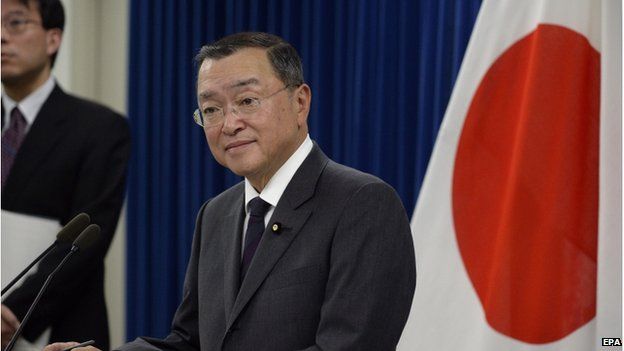Japan minister support staff 'put sex club on expenses'
- Published

Japan's new trade minister has been forced to defend himself after it emerged that staff from his support group spent office money at a sex club.
Yoichi Miyazawa admitted staff had claimed expenses after visiting a sadomasochistic bar in Hiroshima, but emphasised he did not visit the bar.
His admission comes at a difficult time for Prime Minister Shinzo Abe.
Two cabinet ministers quit on Monday. Mr Miyazawa replaced Yuko Obuchi, who resigned over a funding scandal.
Members of Miyazawa-kai, described as a political support group that manages the minister's funds, spent 18,230 yen ($170, £106) at the club in September 2010.
The spending was listed as "entertainment expenses" in the group's political fund report for that year.
"It is true such expenses were made," Mr Miyazawa told reporters. "But I myself did not go there at all. That's true as well."
He plans to correct the report as a person in his office had "erroneously booked the money".
The bar stages performances where women dressed only in underwear are tied up with ropes and whipped, reported Japanese media.
Mr Miyazawa, 64, is the nephew of late PM Kiichi Miyazawa, and cousin of the current foreign minister Fumio Kishida.
He was appointed the new economy, trade and industry minister on Tuesday by Mr Abe.
Mr Miyazawa's predecessor, Ms Obuchi, quit on Monday over allegations that her staff had misused thousands of dollars of campaign funds.
Justice Minister Midori Matsushima quit on the same day, having come under fire for an apparent violation of election laws and rules on usage of political funds. Ms Matsushima was replaced by Yoko Kamikawa.
Their resignations were seen as a blow to Mr Abe's goal of having more female representation in the upper echelons of government.
- Published21 October 2014
- Published20 October 2014
- Published3 September 2014